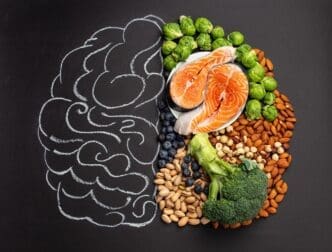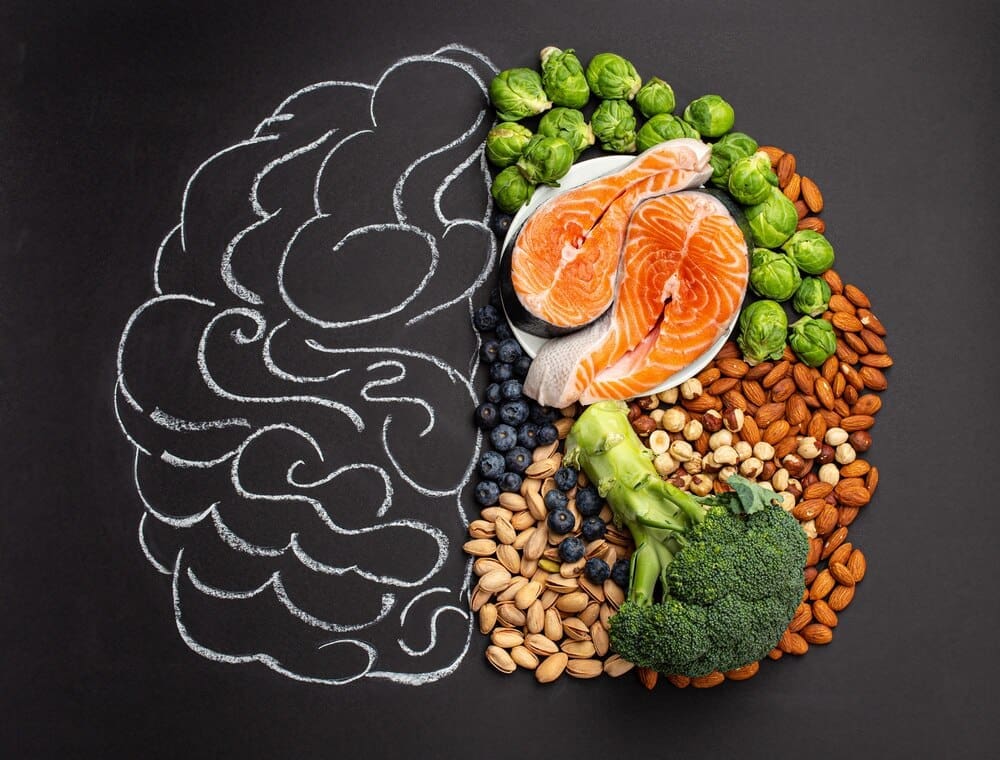The food we eat is not just fuel for our bodies; it is a critical building block for our brains, directly influencing everything from our mood and memory to our ability to focus. For individuals seeking to sharpen their cognitive function and protect their long-term mental health, scientific evidence increasingly points to a diet rich in specific nutrients like omega-3 fatty acids, antioxidants, and essential vitamins. By consistently incorporating certain foods—such as fatty fish, blueberries, and leafy greens—into our daily meals, we can actively support brain cell health, reduce inflammation, and enhance the intricate neural communication that governs how we think and feel. This dietary strategy represents a powerful and accessible tool for boosting mental wellness at any age.
The Connection Between Your Plate and Your Mind
The link between diet and brain health is far more direct than many realize. The brain is an incredibly energy-intensive organ, consuming about 20 percent of the body’s calories. The quality of that fuel matters immensely. Nutrients from our food provide the raw materials for building and repairing brain cells, protecting them from damage, and manufacturing the chemical messengers, known as neurotransmitters, that regulate our mental state.
This relationship is often explained through the gut-brain axis, a complex communication network linking our digestive system with our central nervous system. A significant portion of our body’s serotonin, a key neurotransmitter for mood regulation, is produced in the gut. The health of our gut microbiome—the trillions of bacteria living in our digestive tract—can therefore have a profound impact on our mental clarity and emotional balance.
Furthermore, many brain-healthy foods work by combating two of the primary drivers of cognitive decline: oxidative stress and inflammation. Oxidative stress is damage caused by unstable molecules called free radicals, a natural byproduct of metabolism that can harm brain cells over time. Inflammation is the body’s response to injury or threat, but when it becomes chronic, it can contribute to a host of conditions, including depression and neurodegenerative diseases like Alzheimer’s.
Top 10 Foods for a Sharper Brain
While no single food is a magic bullet, incorporating a variety of the following nutrient-dense options can create a powerful foundation for cognitive vitality. These foods are packed with the specific compounds scientifically shown to support memory, mood, and overall brain function.
1. Fatty Fish
Oily fish like salmon, mackerel, trout, and sardines are celebrated for their high concentration of omega-3 fatty acids. About 60% of our brain is made of fat, and half of that fat is comprised of omega-3s, particularly docosahexaenoic acid (DHA). The brain uses DHA to build new brain and nerve cells, making it essential for learning and memory.
Omega-3s also offer potent anti-inflammatory benefits, helping to protect the brain from the cellular damage that contributes to aging and disease. Studies have linked higher consumption of fatty fish to better cognitive performance and a lower risk of dementia. For those who don’t eat fish, algae-based omega-3 supplements are an effective alternative.
2. Blueberries
These small berries pack a major neurological punch. Blueberries are rich in a class of plant compounds called flavonoids, specifically anthocyanins, which give them their deep blue and purple color. Anthocyanins are powerful antioxidants that can cross the blood-brain barrier and accumulate in brain regions associated with learning and memory.
Research suggests these compounds work by reducing oxidative stress and inflammation, while also improving communication between brain cells. Some studies have shown that regular consumption of blueberries can help delay short-term memory loss and improve motor coordination.
3. Turmeric
This golden spice, a staple in curry powder, contains a powerful compound called curcumin. Curcumin is a remarkable anti-inflammatory agent and antioxidant that has been shown to directly benefit the brain. It can cross the blood-brain barrier, meaning it can enter the brain and exert its effects directly on the cells there.
Curcumin has been shown to boost levels of brain-derived neurotrophic factor (BDNF), a growth hormone that helps brain cells grow and form new connections. It may also help clear amyloid plaques, the protein clumps that are a hallmark of Alzheimer’s disease. To improve absorption, always consume turmeric with a pinch of black pepper, which contains piperine.
4. Broccoli
Broccoli and other cruciferous vegetables like cauliflower, kale, and Brussels sprouts are loaded with brain-healthy nutrients. They are an excellent source of Vitamin K, a fat-soluble vitamin that is essential for forming sphingolipids, a type of fat that is densely packed into brain cell membranes.
Beyond Vitamin K, broccoli contains a number of compounds with potent anti-inflammatory and antioxidant effects, such as sulforaphane. These compounds help protect the brain from the cellular damage that can accelerate cognitive decline.
5. Pumpkin Seeds
Pumpkin seeds are a powerhouse of micronutrients critical for brain function. They are an excellent source of zinc, a mineral vital for nerve signaling and memory formation. They also contain magnesium, which is essential for learning, and copper, which helps control nerve signals. Finally, they are rich in iron, and a deficiency in this mineral is often characterized by brain fog and impaired cognitive function.
6. Dark Chocolate
Good news for chocolate lovers: dark chocolate (with 70% or more cocoa content) and cocoa powder are packed with brain-boosting compounds. These include flavonoids, caffeine, and antioxidants. The flavonoids in chocolate accumulate in areas of the brain that deal with learning and memory, and researchers suggest they may enhance memory and help slow down age-related mental decline.
The caffeine and theobromine in chocolate can provide a gentle boost in mental energy and alertness. Just be mindful of portion sizes, as dark chocolate is still a calorie-dense food.
7. Nuts
Nuts, particularly walnuts and almonds, are excellent for brain health. They contain a mix of healthy fats, antioxidants, and Vitamin E, which protects cell membranes from free radical damage. Walnuts are especially beneficial because they are also a rich plant-based source of omega-3 fatty acids.
Studies have linked higher nut consumption to better brain function in older adults, including sharper memory and faster processing speed. A handful of mixed nuts a day is a simple and effective way to support long-term cognitive health.
8. Oranges
You can get nearly all the Vitamin C you need in a day by eating one medium orange. This is crucial for brain health, as Vitamin C is a key antioxidant that helps fight off the free radicals that can damage brain cells. It’s also essential in the production of neurotransmitters like dopamine and serotonin.
Sufficient Vitamin C intake is a powerful tool for preventing age-related mental decline and supporting overall brain vitality. Other excellent sources include bell peppers, kiwi, tomatoes, and strawberries.
9. Eggs
Eggs are a fantastic source of several nutrients tied to brain health, including vitamins B6 and B12, folate, and choline. Choline is a particularly important micronutrient that your body uses to create acetylcholine, a neurotransmitter that helps regulate mood and memory.
The B vitamins found in eggs also play a crucial role. They can help slow the progression of cognitive decline in older adults by helping to lower levels of homocysteine, an amino acid whose high levels have been linked to an increased risk of dementia and Alzheimer’s disease.
10. Green Tea
Like coffee, green tea provides a boost in alertness due to its caffeine content, but it also contains other compounds that make it uniquely beneficial for the brain. One of these is L-theanine, an amino acid that can cross the blood-brain barrier and increase the activity of the calming neurotransmitter GABA.
L-theanine also increases alpha wave activity in the brain, which helps you relax without feeling tired. The combination of caffeine and L-theanine creates a state of calm alertness, improving focus and performance. Green tea is also rich in antioxidants like EGCG, which protect brain cells from damage.
Building a Lasting Brain-Healthy Diet
Focusing on these ten foods is an excellent start, but the greatest benefits come from adopting a consistently healthy dietary pattern. Diets like the Mediterranean diet or the MIND diet (a hybrid of the Mediterranean and DASH diets) have been extensively studied and are strongly associated with better cognitive outcomes and a lower risk of dementia.
These eating patterns emphasize whole, unprocessed foods, including plenty of vegetables, fruits, legumes, whole grains, fish, and healthy fats like olive oil. They also recommend limiting the intake of red meat, sweets, and processed foods, which can promote the inflammation and oxidative stress that harm the brain.
The key is not perfection but consistency. You don’t need to overhaul your entire diet overnight. Start by adding one or two of these brain foods to your meals each week and gradually build from there. Swapping a processed snack for a handful of nuts or adding a side of broccoli to your dinner are small changes that can make a big difference over time.
Conclusion
Our diet is one of the most powerful and modifiable factors influencing the health and longevity of our brain. By consciously choosing foods rich in antioxidants, healthy fats, vitamins, and minerals, we can actively combat the processes that lead to cognitive decline and mood disturbances. Incorporating nutrient-dense foods like fatty fish, blueberries, nuts, and leafy greens is a practical, evidence-based strategy to enhance memory, sharpen focus, and protect our most vital organ for years to come.












